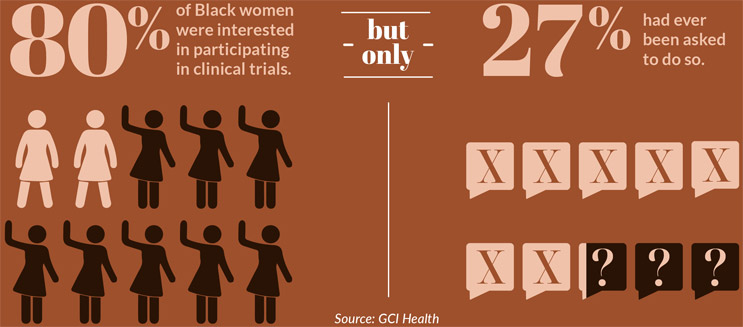5 Strategies To Increase Enrollment Of Black Women In Clinical Trials
By Kianta Key, group senior vice president, GCI Health
Some experts have suggested it’s their distrust of the healthcare system that is deterring Black women from enrolling in clinical trials. While that is partly true, in our recent survey of 500 Black women about their beliefs of and barriers to clinical trial participation, we found that 80% were likely to participate if asked. However, just 27% had ever been asked to do so.
In addition to never being invited to participate in clinical trials, the primary factors preventing the women surveyed from participating in clinical trials were concerns about the safety of the studies and the potential side effects and the logistics of participating.

Knowing this and given the ongoing enrollment disparity that sustains a gap in our understanding of how new treatments might affect those most burdened by disease, particularly Black women, we must act, for this persistent underrepresentation hinders the generalizability of research findings and limits the treatment options providers can offer.
Based on our research, we identified five key strategies to increase the enrollment of Black women in clinical trials.
1. Recognize the intersectional identities of Black women.
Recruitment efforts often focus on broad demographics like "Black women," overlooking the richness of their experiences. There is no one-size-fits-all approach to what will influence a Black woman’s interest in a clinical trial. For instance, the journey to participating in a clinical trial will look different for a working mother living in a rural community than a woman living with a visible disability in an urban setting. While their motivations and concerns may overlap, a nuanced approach that acknowledges these differences is key to building trust and increasing representation.
That was made clear in our survey, particularly when we looked at potential influences for enrolling in a trial based on generation. Black women under 40 years old cited social media influencers and celebrities as highly influential to them, whereas survey respondents ages 40-59 reported that their most reliable sources of input would be someone from their personal care team, such as their hair stylist or nail technician, and also media sources. In contrast, Black women over 60 years old preferred information from their healthcare team, family members, friends, or a patient advocate.
Healthcare teams will always remain an important part of the clinical trial enrollment process, but targeted communications from a trusted voice — whether a celebrity, journalist, or hair stylist — can have more impact on a Black woman’s day-to-day experience. Collaborating with these macro and community-based influencers can raise awareness and provide information about relevant trials, empowering Black women to make informed decisions about participation.
2. Be transparent about safety measures in health research and realistic about the location of trial sites.
We should not be surprised to find that Black women, like anyone else considering taking part in a clinical trial, are most concerned about the safety aspects of their participation. But in addition, there are residual scars in the community surrounding the mistreatment of Black women in medical experiments, and modern participants want to know that they are not being similarly exploited.
Key messaging around the safety of the trial should always be clear, including:
- Procedures that are in place for safety monitoring
- Overview of earlier stages of testing that led to the development of this trial, including the good and the bad:
- What successful outcomes looked like
- What types of adverse events occurred and how they were handled
- Procedures for assessing and managing side effects
- The security of knowing that if additional care is needed, it will not be an out-of-pocket cost to the participant
Feasibility of participation is also key. Decentralizing trials will be key to increasing enrollment for women in rural communities or women who live far from a study site. Travel can take up a lot of time, and that time can factor into considerations, such as:
- caregiver responsibilities for children or elderly family members,
- loss of work time and compensation, and
- ability to complete errands or manage a business.
Black women who want to take part in a clinical trial need to know how these factors will be managed while they are participating. Thus, up-front communications about the possibility of travel assistance, childcare, financial compensation, and insurance coverage are important.
3. Empower HCPs to discuss clinical trials with Black women by providing training, relevant recruitment materials, and encouraging community engagement.
Cultural understanding is crucial for effective communication between healthcare providers and patients, especially when discussing clinical trials. Our survey found that 73% of Black women have never been asked to be a part of a clinical trial. Many factors could be involved, but we need to remove the influence of unconscious bias — or even the outright assumption that they are not interested in participating — to ensure parity in enrollment.
Here's how we can bridge this gap:
- Culturally Sensitive Training: Equip healthcare providers with training on cultural sensitivity communication approaches that resonate with Black women. This can help build trust and understanding.
- Inclusive Recruitment Materials: Develop clinical trial materials that feature diverse images and address Black women's specific concerns. Be clear about safety, feasibility, and how these factors impact participation.
- Community-Based Recruitment: Move beyond traditional clinical settings. Partner with trusted institutions in Black communities, such as churches, advocacy groups, or braid shops, to reach women where they have open and consistent conversations about clinical trials.
Changing the face of who leads research is also imperative. There are efforts like the National Medical Fellowships (NMF) Diversity in Clinical Trials Research Program, which is working to increase the number of underrepresented physicians who are Principal Investigators.
By acknowledging cultural nuances, fostering culturally competent communication and increasing representation in trial investigators, we can increase Black women's comfort and ultimately, their participation in clinical trials.
4. Prioritize mixing a variety of communication platforms to reach Black women about clinical trials.
In a 2007 article on Black women’s perceptions of clinical trial participation, researchers revealed that simple awareness is a core issue. One member of the focus group shared, “I would love to be a part of that (the Women’s Health Registry at the University of Michigan), but I never heard of the registry. I never even knew it existed,” (Smith et. Al, 2007).
Black women cannot opt in for something that they do not know about. Raising awareness about clinical trials and how they connect to medicine should take an always-on approach, taking full advantage of different forms of communication.
While social media plays a crucial role in amplifying clinical trial messaging, traditional channels like television remain essential — especially when reaching diverse audiences. Our survey confirms this, highlighting television as a key source of information for potential participants.
A successful outreach strategy must extend beyond one channel to reach Black women. Consider a multifaceted approach that combines the influence of local radio, the reach of social media, and the broad visibility of television to maximize your impact. With the invention of digitized radio and television, advertising on platforms like iHeart Radio and Hulu can be a part of your approach.
5. Activate the voices of Black women who have participated in clinical trials to become advocates.
There is no substitute for the voice of experience. In our survey, 68% of the Black women who completed a clinical trial said they had a positive experience. Elevating the voices of these women and encouraging them to engage with others in their community can build trust and shift the perceptions of women who feel hesitant or neutral about clinical trials in a more favorable direction.
Hearing from someone who has been through a clinical trial before and had a good experience inspires confidence in the clinical trial process. This can manifest across digital channels like TikTok in partnership with platforms like Health in Her Hue, or in virtual conversations with advocates like the @ClinTrialsLady. It’s also important to think about placing these voices in direct contact with potential participants.
“Move At The Speed Of Trust” To Increase Clinical Trial Enrollment And Advocacy
At SCOPE 2024, Dr. Monique Adams talked about maintaining sustainable action to build trust among marginalized communities. She emphasized that we must “move at the speed of trust” to see true representation in health research. We know that representation of historically excluded groups in clinical trials is important in establishing the safety and efficacy of novel therapeutics. Our survey revealed a strong interest in clinical trial participation among Black women, alongside some understandable concerns. To overcome these hesitations, building trust is paramount. This requires utilizing trusted channels and spokespeople and providing clear, comprehensive information that addresses their specific worries. By recognizing the complexities of their identities and engaging them through channels they already trust, we can encourage greater participation in future research efforts. This inclusivity benefits both medical research advancement and the health of Black women.
You can learn more about Black women’s perceptions of clinical trials here.
About The Author:
 Kianta Key is a leading figure at the intersection of data, digital technology, and health equity. As the creator of the Identity Experience (IX) methodology, Kianta spearheads audience strategy at GCI Health, a global communications agency. Her digital-first approach has benefited clients across the healthcare spectrum, including pharmaceutical companies, non-governmental associations, and third-party groups. She champions diversity, serving on the Marcus Graham Project board and as a co-lead for the People of Culture Employee Resource Group at GCI Health. She has been named a PRWeek Woman to Watch and an ADCOLOR Innovator of the Year finalist. Kianta’s work has garnered industry recognition, including an Innovation SABRE Award for the Best Use of Digital Marketing/Advertising. With degrees in PR and integrated marketing communications, specializing in cultural competency and public health, Kianta's mission is clear: drive systemic change for inclusive healthcare and foster the next generation of diverse communication leaders.
Kianta Key is a leading figure at the intersection of data, digital technology, and health equity. As the creator of the Identity Experience (IX) methodology, Kianta spearheads audience strategy at GCI Health, a global communications agency. Her digital-first approach has benefited clients across the healthcare spectrum, including pharmaceutical companies, non-governmental associations, and third-party groups. She champions diversity, serving on the Marcus Graham Project board and as a co-lead for the People of Culture Employee Resource Group at GCI Health. She has been named a PRWeek Woman to Watch and an ADCOLOR Innovator of the Year finalist. Kianta’s work has garnered industry recognition, including an Innovation SABRE Award for the Best Use of Digital Marketing/Advertising. With degrees in PR and integrated marketing communications, specializing in cultural competency and public health, Kianta's mission is clear: drive systemic change for inclusive healthcare and foster the next generation of diverse communication leaders.
